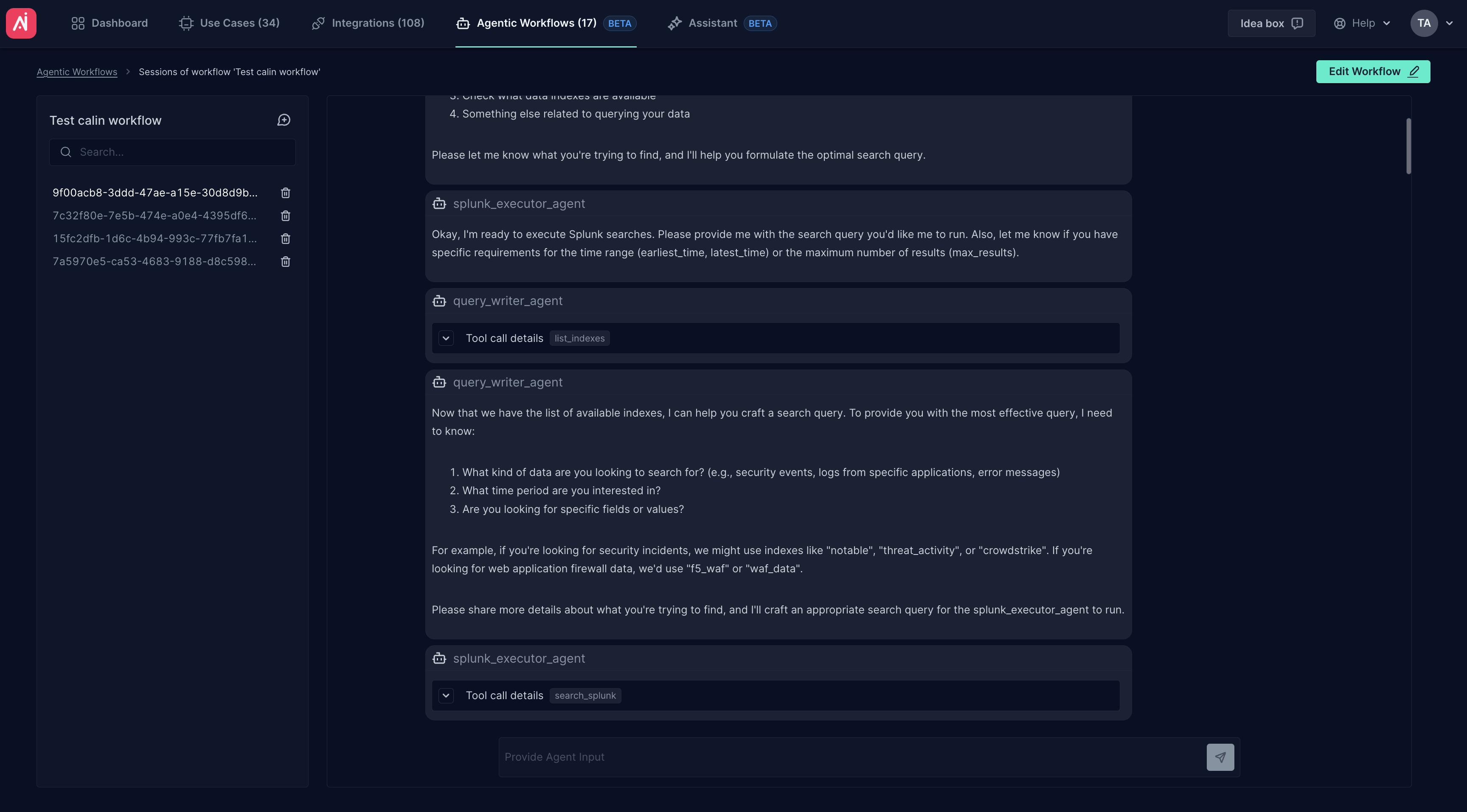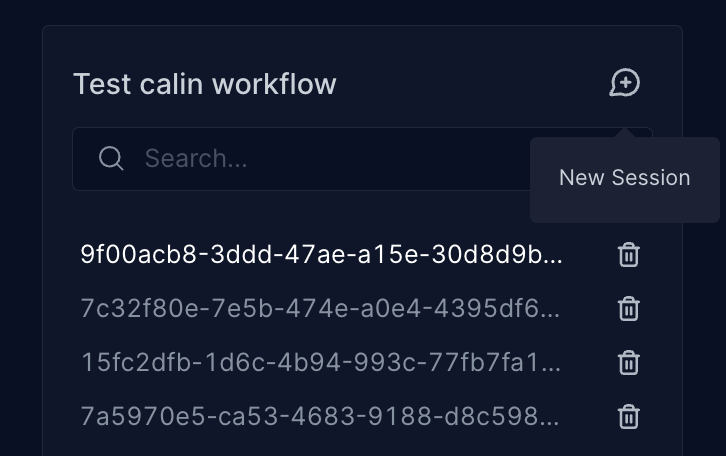Agentic Workflows Execution
Overview
This documentation provides comprehensive instructions for executing agentic workflows within the Arcanna platform. Agentic workflows enable automated agent-based processing of data and events through four primary execution methods: on-demand execution, direct API calls, pipeline integration via code blocks within Flows, and MCP (Model Context Protocol) Server integration.
Prerequisites
Before executing agentic workflows, ensure you have:
- Access to the Arcanna platform with appropriate permissions
- Created at least one agentic workflow in the system
- For programmatic/API access:
- A valid Management API Key
- The workflow ID of the target workflow
Execution Methods
Method 1: On-Demand Execution
On-demand execution allows users to manually trigger and interact with agentic workflows through the Arcanna user interface.
Steps to Execute On-Demand
-
Access the "Agentic Workflows" page from the main navigation
-
Access the Sessions Page
- Upon clicking a workflow card, you will be redirected to the Sessions page
- The Sessions page provides a comprehensive view of workflow executions

-
Managing Sessions
-
Left Panel: Historical sessions list
- Displays all saved sessions by their unique Session ID
- Sessions are listed chronologically
- Click on any session ID to view the complete chat history with agents that you can also continue
-
Main Chat Area: Active session interface
- Start a new session by clicking the "New Session" button

- View real-time responses from the agentic workflow
- Continue conversations of previously saved sessions
- Start a new session by clicking the "New Session" button
-
-
Reviewing Past Sessions
- Click on any session ID in the left panel
- View the complete conversation history
Method 2: Direct API Execution
Direct API execution allows you to trigger agentic workflows programmatically from any external system or application that can make HTTP requests. This method provides the most flexibility for integration with third-party systems.
Setup Requirements
-
Management API Key
- Navigate to
API Keysin Arcanna - Generate a new Management API Key with appropriate permissions
- Store the key securely for authentication
- Navigate to
-
Workflow ID
- Obtain the unique identifier of the agentic workflow you want to execute
- This ID is typically visible in the workflow URL or can be retrieved from the workflows list
-
Agentic API Endpoint
- Identify your Arcanna agents exposer API instance URL
- The base URL format:
https://<ARCANNA_VM_IP>/api/agents-exposer - The Swagger UI describing all endpoints is available at
https://<your-arcanna.ai-url>/docs/agents-exposer.
API Reference
Endpoint
POST /api/v1/agents-workflow/run/{workflow_id}
Headers
| Header | Type | Required | Description |
|---|---|---|---|
| Content-Type | string | Yes | Must be application/json |
| Accept | string | Yes | Must be application/json |
| X-Arcanna-Api-Key | string | Yes | Your Management API Key |
Request Body
{
"session_id": "string (optional)",
"input": "string or object",
"wait_for_completion": false
}
Parameters Explained
session_id: Optional. If provided, the workflow will continue an existing session; otherwise, a new session will be created.input: The data or prompt to be processed by the agentic workflow.wait_for_completion: Synchronous execution flag. If set totrue, the API will wait for the workflow to complete before returning a response. Iffalse, it will return the session id immediately but not the events.
Response
{
"session_id": "uuid-string",
"workflow_result": "null / [ /* array of SessionEvent objects, may be empty */ ]"
}
Example
curl -X POST "https://<ARCANNA_VM_IP>/api/agents-exposer/api/v1/agents-workflow/run/10" \
-H "Content-Type: application/json" \
-H "Accept: application/json" \
-H "X-Arcanna-Api-Key: your-management-api-key" \
-d '{
"input": {
"alert_type": "phishing",
"severity": "high",
"description": "Suspicious email detected"
},
"wait_for_completion": false
}'
Method 3: Pipeline Integration via Code Blocks
Pipeline integration enables automated workflow execution within Arcanna use cases through code blocks in the Flows page. This method is specifically designed for integrating agentic workflows into your data processing pipelines, allowing for automated triggering based on specific conditions or events during the flow execution.
This method utilizes the Direct API Execution approach (Method 2) within the Arcanna pipeline context. For detailed API reference, parameters, and response formats, refer to Method 2 documentation above.
Setup Requirements
-
Identify Workflow ID and API Key
- Follow the same setup requirements as outlined in Method 2
- Ensure you have the workflow ID and Management API Key ready
-
Configure Environment Variables
In your Arcanna environment, ensure the following variables are configured:
ARCANNA_MANAGEMENT_KEY = "your-management-api-key"
AGENTIC_URL = "http://<ARCANNA_VM_IP>:9888/"
Implementation Steps
-
Navigate to Flows Page
- Go to your specific use case
- Navigate to the
Flowspage within that use case - This is where you'll integrate the agentic workflow into your data processing pipeline
-
Create a Code Block in Your Flow
- Add a new code block at the appropriate stage in your flow
- Position it where you want the agentic workflow to be triggered based on your pipeline logic
-
Implement the Pipeline Integration Code
Below is a complete example implementation for pipeline integration:
def transform(input_record):
"""
Pipeline integration function that processes input records and triggers
agentic workflow based on specific conditions within the data flow.
Args:
input_record: The incoming data record from the pipeline
Returns:
The original input_record (pass-through pattern for pipeline continuation)
"""
# Define your pipeline trigger condition
# Example: Execute workflow when Arcanna detects phishing
if input_record.get_arcanna_fields()["result_label"] == "Phishing":
# Use the same API approach as Method 2
headers = {
"accept": "application/json",
"Content-Type": "application/json",
"X-Arcanna-Api-Key": env_variables.get("ARCANNA_MANAGEMENT_KEY")
}
# Construct the workflow endpoint URL
workflow_id = '16' # Your agentic workflow ID
url = env_variables["AGENTIC_URL"] + f'/api/v1/agents-workflow/run/{workflow_id}'
# Prepare the pipeline data for the workflow
alert = {k: v for k, v in input_record.items()}
# Configure the request payload (see Method 2 for detailed parameter explanations)
data = {
"input": alert,
"wait_for_completion": False # Recommended for pipeline performance
}
# Execute the workflow within the pipeline
try:
response = requests.post(url, headers=headers, json=data)
print(f"Agentic workflow triggered from pipeline: {response.json()}")
except Exception as e:
print(f"Pipeline workflow execution error: {str(e)}")
# Continue pipeline processing even if workflow fails
pass
# Always return the input record to continue the pipeline flow
return input_record
Pipeline-Specific Considerations
- Performance Impact: Use
wait_for_completion: Falseto avoid blocking the pipeline - Error Handling: Implement robust error handling and/or fallback behaviour
- Conditional Execution: Only trigger workflows when specific pipeline conditions are met
Method 4: MCP (Model Context Protocol) Server Integration
MCP Server integration enables AI models and applications to execute agentic workflows through the Model Context Protocol standard. This method provides a standardized interface for AI assistants, agents, and other AI-powered applications to interact with Arcanna workflows.
MCP Tools Available
The Arcanna MCP Server exposes the following tools related to agentic workflows:
- Tool:
run_agentic_workflow - Tool:
list_agentic_workflows
Best Practices
1. Error Handling
- Always implement try-catch blocks for workflow executions
2. Performance Optimization
- Use asynchronous execution (
wait_for_completion: false) for high-volume processing
3. Security
- Store API keys in secure environment variables
- Never hardcode API keys in your code
4. Data Handling
- Validate input data before sending to workflows
- Implement data sanitization where necessary